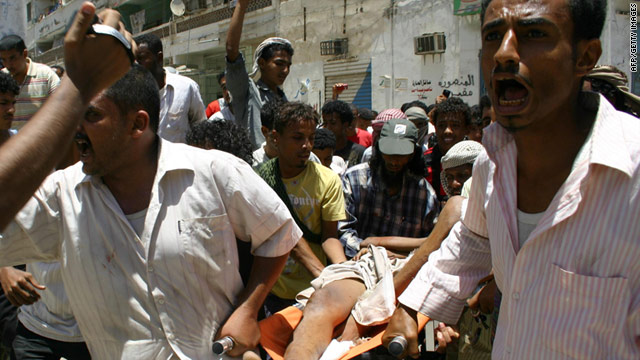Yemen deal in limbo as mediator abruptly leaves presidential meeting

- NEW: The head of a Gulf coalition cuts short his meeting with President Saleh
- NEW: Saleh made two last-minute demands on a peace deal, a party official says
- NEW: An opposition spokesman says they expected Saleh to back out of the deal
- The Gulf Cooperation Council had brokered an agreement to end the Yemen crisis
(CNN) -- The head of the Gulf Cooperation Council abruptly left a meeting Saturday with Yemen's president, departing Sanaa without comment and leaving a hard-fought political deal aimed at ending months of turmoil on the verge of collapse, said a senior Yemeni ruling party official.
Abdullatif Al-Zayani, the secretary-general of the six-nation coalition that helped broker the accord, arrived in the Yemeni capital earlier in the day. But his talks with President Ali Abdullah Saleh were cut short, and he appeared visibly angry as he passed reporters and refused to answer questions en route to his plane.
Saleh and the Yemeni opposition had previously agreed to a deal in principle to address the discontent. It stipulates that the Yemeni president transfer power and leave office within 30 days of signing it, and provides immunity for him and those who served in his regime. It also calls for a unity government to be formed within seven days.
But that agreement hit a roadblock earlier Saturday, when Saleh insisted he would not go to Saudi Arabia to sign the agreement and would instead send an adviser, Abdulkareem Al-Eryani.
"We do not feel it is in Yemen's (best) interest that Saleh attends the signing in Riyadh. Saleh is a member of the ruling party and has the right to send members on his behalf," said a second senior ruling party official, who didn't want to be identified because he was not authorized to speak about the matter.
During his meeting later in the day with Al-Zayani, Saleh made a last-minute demand that the pact be signed in Sanaa and not Riyadh, the other ruling party official said. He also said that he'd now sign it as a leader of his ruling party, the General People's Congress -- and not in his capacity as president, as previously agreed upon.
A spokesman for the Joint Meeting Parties said the opposition bloc was not surprised by Saturday's developments, viewing it as evidence that Saleh would not and never intended to finalize the deal. The group previously said that they'd only sign the agreement if the president himself went to Saudi Arabia.
"President Saleh refused to sign the GCC proposal, and this is what we expected all along," said Mohammed Qahtan, the spokesman.
This uncertainty comes as the massive countrywide protests that started in February continue to shake the impoverished and politically unstable nation.
Saleh's unpopular government has been aligned with the United States in the fight against al Qaeda militants and he has been trying to link his political opponents to terrorism. On Friday, the state-run news agency SABA said police killed an al Qaeda militant with ties to elements of the opposition Joint Meeting Parties.
Hundreds of thousands of anti-government protesters poured out into the streets of at least 13 of the country's provinces on Saturday, all demanding Saleh step down immediately.
Beyond its feelings that Saleh should sign the deal in his capacity as president and in Saudi Arabia, Yemen's opposition issued a statement on Thursday warning that "massacres" against street protesters could also derail the arrangement.
That statement came out one day after 13 anti-government protesters were killed in Sanaa and another was killed in Aden province after protesters were attacked by security forces, the opposition said. More than 100 others were wounded.
"We accepted the Gulf proposal to avoid the spilling of Yemeni blood. But if killing does not stop, we will continue the revolution and the government will never be forgiven for the massacres against the people," the opposition said in a statement.
"It seems that the Saleh regime is using the GCC proposal to kill people and spill the blood of Yemenis. We will not accept the proposal if the violence doesn't immediately end."











